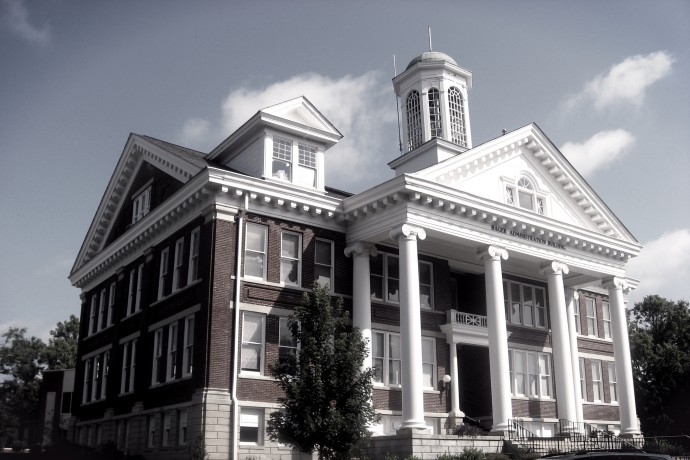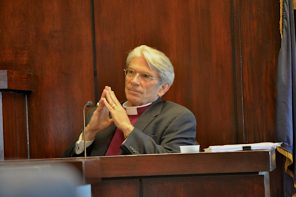On a fall day in 1998 I sat opposite the kindly guidance counselor at my Midwestern Christian high school who extolled the virtues of evangelical higher education. She seemed concerned that Christian students’ faith might be weakened or lost were they to enroll in a secular institution. For me, this was a red flag. If Christianity was the Truth, then what was the danger in the open-ended exploration of ideas? I ultimately opted for Ball State University, though many capable classmates, like many current and former evangelicals I’ve met since, chose evangelical colleges or universities, confident that they would prove compatible with authentic intellectual inquiry and tolerance for a range of political views. Given a worrisome trend at a number of Christian schools, not all would make that same choice today.
Larycia Hawkins, associate professor of political science at Wheaton College and the only tenured woman of color in the school’s 156-year history, is just the latest case to hit the headlines. After initially suspending Hawkins for asserting in a Facebook post that Christians and Muslims worship the same God, Wheaton has initiated proceedings to terminate her claiming that she has violated the school’s statement of faith that she, like all faculty, had signed.
It was recently revealed that Wheaton Provost Stanton Jones called the remark itself “innocuous,” and that other Wheaton faculty who recently expressed solidarity with Islam have been let off the hook with much simpler clarifications. Many commentators, including some prominent evangelicals and Wheaton faculty, are thus not buying the administration’s rationale for its treatment of Hawkins.
“Dissenting professors are being purged, non-conforming students are being intimidated, speech is chilled, and academic freedom is on life support.”
“Laura” (not her real name), a Wheaton alumna who studies Christian theology, sent RD the following sobering assessment: “Several dimensions of the current situation at Wheaton raise serious doubts as to whether an evangelical Christian liberal arts education is in fact possible.”
“The education I received at Wheaton suggested so,” she continued, but, in her view, the “ominous overtones of evangelical complicity in racism and sexism cloaked in theological language [suggest otherwise].” This is particularly true now that discrepancies between how Hawkins and other professors have been treated have surfaced.
Faculty brain drain
Laura’s observations are of a piece with physicist and public intellectual Karl Giberson’s broader assessment of evangelical higher education in America.
A professor from 1984-2011 at Eastern Nazarene College, where his support for the compatibility of evolution and faith got him into trouble, Giberson has been closely following the recent conservative backlash on evangelical campuses. When RD spoke with him in September he observed that “the white, male evangelical power structure in the United States is toppling, and that constituency is not prepared to share leadership.”
Asked about the Hawkins case in a recent email, Giberson called it “another indication of a theological paranoia that seems to be sweeping across the American evangelical landscape.” He then added that “evangelicals have all but lost the ability to engage with the great questions of our time.”
Giberson—now an Episcopalian and scholar-in-residence in science and religion at Stonehill College, a Catholic institution—has begun to express concern over a faculty “brain drain” from evangelical institutions. The Obama years have indeed been marked by an intense conservative crackdown on evangelical campuses, which has thus far proven impervious to the rise of alumni and student-led demands for change in the form of petitions and advocacy and support groups. Dissenting professors are being purged, non-conforming students are being intimidated, speech is chilled, and academic freedom is on life support. Examples are easily multiplied.
Back in 2013, Sarah Jones, an alumna of Cedarville University, suggested that the Baptist institution, “intends to rid itself of moderate influences and establish itself as an exclusively conservative institution.” The claim seems wholly justified in light of the shutting down of the student newspaper, the new ban on women teaching Bible classes to men, and the suspicious circumstances in which the philosophy major was dissolved (the administration denies political motivation). Gordon College, known not long ago as a haven for moderate and progressive voices within evangelicalism, had its accreditation investigated by the New England Association of Schools and Colleges (NEASC) in 2014 after President D. Michael Lindsay signed a letter to President Obama requesting the “religious freedom” to discriminate on the basis of sexual orientation in hiring. Lindsay set up a face-saving working group on LGBTQ issues to placate the NEASC, but it quickly became clear that no substantive change would come from it. Jesse Steele, the only openly queer student in the working group, actually resigned in protest as it was about to complete its work.
Gordon College, known not long ago as a haven for moderate and progressive voices within evangelicalism, had its accreditation investigated by the New England Association of Schools and Colleges (NEASC) in 2014 after President D. Michael Lindsay signed a letter to President Obama requesting the “religious freedom” to discriminate on the basis of sexual orientation in hiring. Lindsay set up a face-saving working group on LGBTQ issues to placate the NEASC, but it quickly became clear that no substantive change would come from it. Jesse Steele, the only openly queer student in the working group, actually resigned in protest as it was about to complete its work.
Gordon (along with Wheaton and many other evangelical schools) was subsequently named one of Princeton Review’s 20 most LGBTQ-unfriendly campuses in 2015—rightly, in Steele’s view. In an interview with RD, he maintained that the administration did little to counter incidents of anti-LGBTQ bullying that were brought to its attention while he was a student.
Meanwhile, Lindsay’s administration used a financial crisis to get rid of independent faculty voices (including those with tenure), clearly targeting professors sympathetic to LGBTQ affirmation or holding other positions unacceptable to hardline social and theological conservatives. According to recently retired English professor Paul Borgman, in many cases targeted faculty were offered “buyouts.” In return for these severance packages, they were forced to sign “draconian” non-disparagement agreements meant to prevent them from speaking out about their mistreatment.
(A number of sources confirmed that similar non-disclosure agreements have been used at Cedarville, and Steele indicated that most members of Gordon’s LGBTQ working group signed confidentiality agreements, although he refused, in spite of pressure.)
The conversation was over
RD recently spoke with two former Asbury University professors who are part of the evangelical “brain drain.” Like Hawkins and Giberson, they have a history of unpleasant encounters with school administrators. David Wheeler is a self-described “fugitive from the evangelical subculture” who taught journalism for nine years at Asbury, which bills itself as a nondenominational Christian liberal arts university. After the 2014-15 academic year he left for the University of Tampa. Wheeler writes:
A big reason I left was the very un-loving way my Christian employer, Asbury University, dealt with LGBT people and their allies… When I was a student there, in the 1990s, there was a serious conversation going on regarding gay Christians. But when I came back there to teach, from 2006 until 2015, the conversation was over… Asbury had unfortunately realized that they could market themselves as a place for angry and disillusioned social conservatives.
In the spring of 2009, Wheeler allowed Katie Payne, then a senior and the managing editor of The Collegian, Asbury’s student paper, to publish an op-ed making a Christian case for affirmation of monogamous same-sex relationships.
“In my naiveté I thought that students, faculty, and staff would be delighted by a thoughtful, well researched discussion of homosexuality,” Payne told RD. The result was explosive. Not only did she receive “cruel and threatening” notes and “desperate thank yous from LGBT students,” she says, but “faculty members discussed the editorial in their classes and threatened to prevent me from graduating while also questioning my salvation.”
Payne was berated by Asbury board member, prominent conservative activist, and former George W. Bush speechwriter Janice Shaw Crouse, whose missive Payne shared with RD. Crouse, who also withdrew a networking offer that she had extended, told Payne in no uncertain terms, and despite the citations of theologians in Payne’s op-ed, “Your views are irrelevant when it comes to a theological position based on Biblical understanding.” In the letter Crouse also hints that Payne may have been deliberately attempting to damage the school:
I doubt you fully understand the firestorm that you have unleashed with an article that is so blatantly antithetical to the historic foundations of Biblical Christianity on which Asbury College has built a world-wide reputation… Or perhaps you know exactly what you intended to do and that is the reason that this article was written as it was and why it is being published at the end of the school year when the college’s opportunity to mitigate the damage will be limited.
Payne describes the incident as a “turning point.” Her experience of making friends with LGBTQ individuals had led to disgust with how most evangelicals treated them. “Christians are always trying to warn you not to let other Christians affect your faith,” she told RD, “but when your religious community and leaders are actively discouraging your well-being and seeking to limit your ability to thrive there isn’t much comfort in the knowledge that god is probably on your side and they just have it all wrong.” After a few more years of trying to hold on, she left Christianity behind.
“For those of us not directly tied to evangelical institutions of higher education, the least we can do in solidarity with the faculty caught up in witch-hunts and the students who are being deprived of an authentic liberal arts education, and in some cases bullied, is to let them know that we are paying attention, and we are not indifferent.”
We are paying attention
Joshua Overbay, who taught film at Asbury from 2010-2014 and is now an assistant professor at Louisiana State University, has a similar story. Believing that even within a common faith community students ought to be free to explore a variety of perspectives, Overbay allowed his film students to create classroom projects that did not adhere to Asbury’s public performance guidelines.
All public performances at Asbury, according to these guidelines, must “promote a Christian worldview,” while cursing, taking the Lord’s name in vain, and sexual innuendo are all forbidden. The controversy stirred up by Overbay’s pedagogical approach, which he insists was not in violation of the faculty handbook, led to the administration unilaterally changing the rules to require that even classroom projects conform to the public performance standards.
Overbay also describes what he calls an “inquisition” that began shortly after his arrival, with prospective hires now being asked to state their position on same-sex marriage, with their employment hinging on the answer. (Asbury President Sandra Gray’s office did not respond to an e-mail request for comment.) Giberson says the same litmus test has been applied at Eastern Nazarene College and elsewhere.
Overbay, who describes himself as a “Christian agnostic” and says that he has come closer to believing again since leaving Asbury’s toxic environment behind, still believes that a genuine Christian liberal arts education ought to be possible. With the departure of professors like Overbay and Wheeler, LGBTQ students and those who do not hold hardline conservative political and/or theological views—or those who are simply questioning aspects of their faith—are losing the possibility of confiding in the kind of understanding and nonjudgmental professor that’s increasingly difficult to spot on evangelical campuses.
Overbay, Wheeler, and Giberson are among a small group of former insiders willing and able to speak publicly about their experiences because they’ve moved on to more open environments and aren’t bound by non-disparagement agreements. The majority of people RD contacted wouldn’t (or couldn’t) comment on the record, but the pain caused by these colleges and universities is palpable. As Richard Flory recently observed here on RD, “many lives have been ruined in the name of theological purity.” I, too, am pessimistic about the future of American evangelicalism, but I join him in his reminder that that future has not yet been written.
As the administrations at evangelical schools are acting on both ideological imperatives and financial incentives—donors often threaten to withhold funds, and parents may refuse to send their children if the schools fail to toe the line—the likelihood of effecting positive change through external pressure is minimal. The Hawkins case at Wheaton may yet prove to be the exception to the rule, as a number of insiders are holding out hope that she will be reinstated. Perhaps there’s even a slight chance of a broader reversal.
But whatever the outcome for Hawkins, the extent of the conservative crackdown on evangelical campuses is worth noting. One of the frustrations mentioned again and again by sources is how dishonest the schools have been about their motives for removing faculty and silencing dissent.
For those of us not directly tied to evangelical institutions of higher education, the least we can do in solidarity with the faculty caught up in witch-hunts and the students who are being deprived of an authentic liberal arts education (and in some cases bullied), is to let them know that we are paying attention, and that we are not indifferent. These stories of dissent and disagreement complicate any kind of “sea change” narrative about American evangelicalism moving toward moderation and openness. But whatever the future of American evangelicalism, I can’t help but wonder how many of my generational peers who chose evangelical higher education, given today’s climate, would have joined me at Ball State.





